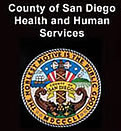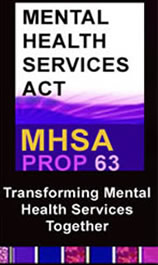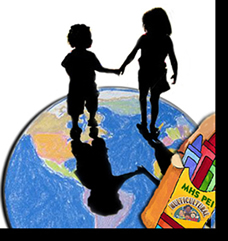MENTAL HEALTH SERVICES ACT • MHSA • PROP 63 |
|||||||
The impact of stress in families, children and youths
Introduction ...People with good emotional health are aware of their thoughts, feelings and behaviors. They have learned healthy ways to cope with the stress and problems that are a normal part of life. They feel good and secure about themselves and have healthy relationships. However, many things that happen in life disrupt emotional health and lead to strong feelings of sadness, stress or anxiety. These things include being laid off from your job, having a child leave or return home, dealing with a chronic illness or the death of a loved one, getting divorced or married, suffering an illness or an injury, getting a job promotion, experiencing money problems, moving to a new home or town, or having a baby. “Good” changes can be just as stressful as “bad” changes. By recognizing problems and seeking help early on, you can help your child — and your entire family — move through the tough times toward happier, healthier times ahead. ...Parents, who can cope with the stresses of everyday life, as well as an occasional crisis, have resilience; they have the flexibility and inner strength necessary to bounce back when things are not going well. Parents with resilience are generally able to cope on their own, but they also know how to seek help in times of trouble. Their ability to deal with life’s ups and downs serves as a model of coping behavior for their children. However, multiple negative life stressors, such as a family history of abuse or neglect, health problems, marital conflict, One of the many factors that can affect the emotional health of young children is the mental health status of their parents. For example, depression among young mothers has been shown to influence the mental health of their young children. These findings are significant because mental disorders that occur before the age of six can interfere with critical emotional, cognitive, and physical development, and can predict a lifetime of problems in school, at home, and in the community. Without intervention, child and adolescent disorders frequently continue into adulthood. Each year, young children are expelled from preschools and childcare facilities for severely disruptive behaviors and emotional disorders. Early childhood is a critical period for the onset of emotional and behavioral impairments. In 1997, the latest data available, nearly 120,000 preschoolers under the age of six - or 1 out of 200 - received mental health services.
|
|||||||
Transforming Mental Health Services Together |
|||||||
Salud+HealthInfo is for information and educational purposes only. You should not rely on this information as a substitute for personal medical attention, diagnosis or hands-on treatment. If you are concerned abut your health or that of a child, please consult your family's physician or health provider immediately and do not try to diagnose yourself. Salud+Health Info is published and distributed free of charge by Info Option Network (ION) Publishing Company. Copyright © 2001-2008 Info Option Network |
|||||||
Bienvenido a la primer revista dedicada al cuidado de la salud
 info
info
The first, the best & the only English & Spanish Magazine in San Diego, California
|




 and domestic or community violence—and financial stressors such as unemployment, poverty, and homelessness—may reduce a parent’s capacity to cope effectively with the typical day-today stresses of raising children. Individuals who have experienced traumatic events oftentimes suffer psychological stress related to the incident. In most instances, these are normal reactions to abnormal situations. While early identification and timely intervention can greatly improve the likelihood of positive developmental outcomes for these children, accessing appropriate developmental and remedial services can be a significant challenge for families and agencies. Identifying and coordinating specialized medical care, developmental assessment, special education, respite care, psychological or psychiatric services, financial assistance, recreational programs, and supportive family counseling is a complex and often daunting undertaking (Children and Family Research Center, 2004). Many child welfare agencies depend on community providers and other service systems to meet the specialized needs of these children and their families. Unfortunately, in many communities, the parents who can not cope with stresses of every day life, as well as an occasional crisis, may have guilt, may live in denial and refused to seek specialized services. This creates additional challenges for families and their children.
and domestic or community violence—and financial stressors such as unemployment, poverty, and homelessness—may reduce a parent’s capacity to cope effectively with the typical day-today stresses of raising children. Individuals who have experienced traumatic events oftentimes suffer psychological stress related to the incident. In most instances, these are normal reactions to abnormal situations. While early identification and timely intervention can greatly improve the likelihood of positive developmental outcomes for these children, accessing appropriate developmental and remedial services can be a significant challenge for families and agencies. Identifying and coordinating specialized medical care, developmental assessment, special education, respite care, psychological or psychiatric services, financial assistance, recreational programs, and supportive family counseling is a complex and often daunting undertaking (Children and Family Research Center, 2004). Many child welfare agencies depend on community providers and other service systems to meet the specialized needs of these children and their families. Unfortunately, in many communities, the parents who can not cope with stresses of every day life, as well as an occasional crisis, may have guilt, may live in denial and refused to seek specialized services. This creates additional challenges for families and their children.